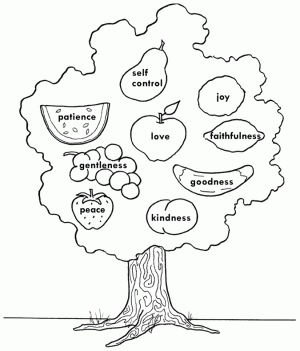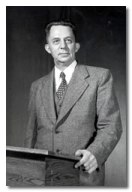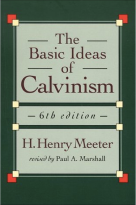 With the help of an analysis of the relevance of modern “two kingdom theology” to the issue of guns (available here), we are given further opportunity for reflecting on implications for whole life Christian obedience in the world.
With the help of an analysis of the relevance of modern “two kingdom theology” to the issue of guns (available here), we are given further opportunity for reflecting on implications for whole life Christian obedience in the world.
As one of the essay’s conclusions, we are told that more artists and chefs, and fewer police officers and soldiers, are not necessarily indications of Christ’s kingdom having arrived.
Agreed!
Rather, it is claimed, “the signs of Christ’s kingdom are more ministers, more church members, more congregations . . ., and more fruit of the Spirit.”
Doubly agreed!
So then, let’s take a moment to review those “fruit of the Spirit.”
Set in opposition
The fruit of the Spirit are mentioned in Galatians 5.22-23, and set in direct opposition to the works of the flesh identified immediately before, in Galatians 5.19-21:
19 Now the works of the flesh are evident: sexual immorality, impurity, sensuality, 20 idolatry, sorcery, enmity, strife, jealousy, fits of anger, rivalries, dissensions, divisions, 21 envy, drunkenness, orgies, and things like these. I warn you, as I warned you before, that those who do such things will not inherit the kingdom of God (ESV).
22 But the fruit of the Spirit is love, joy, peace, patience, kindness, goodness, faithfulness, 23 gentleness, self-control; against such things there is no law (ESV).
Notice:
1. In the original, each of the two phrases, “the works of the flesh” and “the fruit of the Spirit,” involves a kind of (Greek, grammatical) genitival relationship. Daniel Wallace opts for a Genitive of Production/Producer (in Greek Grammar Beyond the Basics, 106), which means that the flesh produces these works, whereas the Spirit produces this fruit.
2. The “works” (plural) of the flesh are set over against the “fruit” (singular) of the Spirit. The fact that the flesh produces a disparate plurality of something, whereas the Spirit produces an integrated unity of something, is instructive regarding the nature of sin and of grace. Sin disperses and dissolves, whereas grace integrates and unifies.
3. The Spirit-as-source of this fruit guarantees the uniqueness of these characteristic Christian moral responses. Precisely what constitutes that uniqueness need not occupy us here, since it can be argued that several of these “fruit” are identified with words common to moral discourse in the ancient world. Suffice to say, for the moment, that part of that Christian uniqueness can be described helpfully with the use of an analogy: as a magnet organizes and arranges iron filings in a certain way, so too the gospel organizes and arranges the “fruit”-responses of Christian living in a way uniquely suited to the gospel.
4. Those responses identified as “the fruit of the Spirit” are essentially and inherently public and social responses. In other words, there is no such thing as private, individualistic love, joy, peace, etc. No one denies this, I think.
The necessary implication
Now, it is true that (1) “the fruit of the Spirit” are among the signs of Christ’s kingdom. It is also true that (2) these fruit of the Spirit are characteristically Christian public and social responses to the gospel, responses belonging to Christian living in the world. It is also true that (3) such characteristically Christian responses bear witness in the world to the reality and power of Christ’s kingdom. Therefore, although the kingdom of Christ can be associated with and rooted in the institutional church, the reality and power of Christ’s kingdom cannot be restricted or limited to that expression known as the institutional church. This claim is the legitimate conclusion from the preceding argument involving the public and social nature of the fruit of the Spirit, which are among the signs of Christ’s kingdom.
So then, given both Galatians 5 and the rest of New Testament teaching about these “fruit of the Spirit,” it seems both impossible and implausible to restrict this sign of the kingdom to the institutional church and its activities of administering the means of grace.
More agreement and analysis
Perhaps these implications and their valid conclusion are so self-evident and agreeable that they need not have been explained. Perhaps.
That would be great, were that the case. Nonetheless, the essay linked above concludes with some sentences, quoted below, that provide a good opportunity for still more pointed reflection. We’ve added a number to each sentence for ease of reference:
[1] The church doesn’t need guns. [2] It enforces God’s law and proclaims the good news through spiritual means. [3] But until Christ’s return and the ultimate sorting out of the wheat and the tares, society will need guns. [4] Rules for owning, manufacturing, and selling guns will come not from God’s word (which is silent about such matters) but the shifting sands of human reflection.
To each of these sentences, given the preceding context and discussion of the entire essay, we’d have to reply with a “yes, but.”
Regarding [1]: yes, guns are not the church’s instrument of persuasion, but might be the church’s instrument of protection. For example, if today’s circumstances of endangered public gatherings might warrant guns as a precautionary safety measure, perhaps the elders may wish to ask someone patrolling the narthex or the parking lot to be unobtrusively armed.
Regarding [2]: yes, this is absolutely true. BUT God’s law-enforced-by-spiritual-means addresses issues like peace, goodness, faithfulness, and self-control with regard to activities done by Christians beyond the institutional church. Here is the repeated, simple, clear challenge to contemporary “two kingdom theology”: Is the preceding sentence true or false? Yes or no? Granting that Christians have messed up in enforcing God’s law, perhaps in a hundred different ways, the question remains: Does God’s law-enforced-by-spiritual-means address activities done by Christians beyond the institutional church?
Regarding [3]: yes, the claim is absolutely true that “until Christ returns, society will need guns.” BUT: even if you remove the name “Christ,” this is not merely a descriptive claim, but is a specifically biblical eschatological and moral claim. You cannot know this statement to be true apart from special revelation. The truthfulness of this claim cannot be argued validly from natural law. Of course, there are plenty of non-Christian philosophers and political theorists who make a similar claim. But that fact does not contradict the biblical origin or quality of the claim. Therefore, there exists a “biblical viewpoint” regarding “gun control.” See below.
Regarding [4]: yes, this is absolutely true. BUT: the claim that “until Christ returns, society will need guns” is necessarily a faith claim, available only via Scripture, and is therefore part of a Christian biblically-derived analysis of and response to arguments pertaining to “gun control.” How that gets implemented in terms of rules for owning, manufacturing, and selling guns will come from “the shifting sands” of historical development as well as human reflection.
Simply stated, the Bible teaches that (in one sense) the church doesn’t need guns, and that until Christ returns, society will need guns. And the Bible does not teach that the Glock 30SF ought to be outlawed. This example illustrates precisely how Scripture can “speak to all of life” without determining every precise detail of life.







